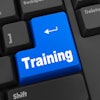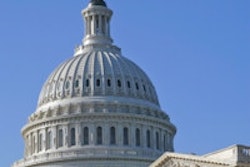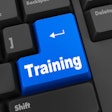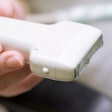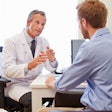Radiology residents aren't immune to inappropriate online behavior, but they can learn to steer clear of it, according to an article in Academic Radiology that examined "digital professionalism." The study found both room for improvement and the desire to achieve it.
The article was the product of surveys and a workshop that presented a series of radiology-based online situations for residents to consider. Participants discussed the posting of unprofessional materials online, friending their attending physicians on Facebook, posting patient x-rays, and more. Most thought the surveys and workshop were helpful for increasing awareness (Academic Radiology, November 2012, Vol. 19:11, pp. 1408-1414).
"We looked into digital professionalism and it's just a loaded gun," said lead investigator Dr. Justin Kung, from Beth Israel Deaconess Medical Center, in an interview with AuntMinnie.com. "Digital media really has blurred the boundary between your personal and professional life, so you basically have to realize that everything you put on Facebook and all these websites can be accessed by patients."
Developing that kind of diligence among the physicians of tomorrow is increasingly a goal of medical education, which is trying to keep up with the wholesale changes in society that encourage the sharing of life's most intimate details, according to Kung.
"It's not horrible to use social media, it's basically how you use it," he said. "You have to be very diligent in screening whom you're letting see it."
Teaching professionalism
In recent years, radiology residency programs have incorporated methods such as role-modeling and 360° multisource feedback from peers, attending physicians, patients, and nurses. Some training programs, including Beth Israel's, have incorporated reflective practice as a way to teach professionalism in hopes of avoiding digital train wrecks, the worst of which can breach patient-doctor confidentiality to the detriment of everyone.
Social media also brings benefits, of course, including instantaneous communication, networking, and consultation.
"The ease of accessibility of such sites, however, often blurs the boundary between professional and personal identities," wrote Kung and colleagues Dr. Ronald Eisenberg and Dr. Priscilla Slanetz. "This is especially concerning because patients, colleagues, and future employers may have access to this online information."
While the concept of digital professionalism can't be strictly defined or measured objectively, the American Medical Association has published guidelines on the professional use of social media for medical schools and residency programs tasked with ensuring professional conduct among their trainees. In addition, the Accreditation Council for Graduate Medical Education (ACGME) mandates digital professionalism as a core competency of physicians.
"Reflective practice is a process whereby an individual critically thinks about a thought, experience, or action with the ultimate outcome being increased self-awareness and professional competence," Kung and colleagues wrote. "This method has been shown to enhance professional growth."
The study, funded by a grant from the Association of University Radiologists, consisted of a small-group reflective practice-based session that presented scenarios on digital professionalism specific to radiology, as part of a broader effort to gauge the impact of reflective practice on radiology residency. Surveys were given before and after the session, evaluating residents' views toward and understanding of digital professionalism.
"That was the main objective of the grant: to expose residents and let them think about different aspects of professionalism, digital professionalism being one example," Kung said. "Reflective practice is exactly what it sounds like: making residents actually think introspectively and talk with others about a specific topic and increasing self-awareness. We talk about digital professionalism and the residents then talk about their own experiences, and through that you increase awareness."
The three program directors held six 90-minute sessions in 2011 and 2012 for second- through fifth-year residents. Before each session, the directors sent the residents cases highlighting unprofessional online conduct plucked from the media, as well as radiology-specific cases. They were surveyed before and after on their views and understanding of digital professionalism, and the results were collected anonymously on SurveyMonkey.
Residents were asked to rate survey statements using a five-point Likert scale, with 1 indicating strong disagreement and 5 strong agreement, in addition to completing multiple-choice questions and free-text answers.
In all, 25 residents (17 men, 8 women; all younger than 40) responded to the presession survey. Among the results:
- All of the respondents had been on Facebook in the past year; 19% had been on Twitter, 23% on LinkedIn, and 28% on Google+. About 40% used social media daily, with an additional 28% logging on at least weekly. Four-fifths of respondents used the sites for personal reasons, with the rest saying they used the sites for both personal and business purposes.
- Respondents said they often friended work colleagues, including nurses (65%), attending physicians (70%), physician assistants (40%), technologists (55%), and medical assistants (20%).
- Half (12/24) of respondents reported witnessing an unprofessional posting on Facebook, and 8% (2/25) reported posting something unprofessional themselves. Still, most respondents felt that social media had no impact on their professional careers (92%; 22/24).
- In line with recent negative publicity surrounding Facebook's privacy settings, only 20% of respondents said they were completely comfortable with their social media privacy settings; 12% said they were somewhat confident and 58% said they were somewhat unconfident managing the settings. Eight percent were completely unconfident.
- Most respondents had a benign view of social media's effect on their lives, with 8% saying the experience had affected them positively, and 92% responding that it hadn't affected them one way or the other.
Twenty-one residents attended the session, and after the session, 13 responded to the postsession survey:
- Residents were satisfied with the session content, and most said it would make them think about their own use of social media (3.62 on the five-point scale) and that it added to their understanding of professionalism (3.92).
- Most felt digital professionalism was important to their careers (4.08), and as a result of the session, they would become more aware of protecting privacy and confidentiality on social media sites (3.92).
- They also said they would take a more active role in ensuring professional use of social media with regard to patient care (4.00), and that the session would change the way they used social media personally (3.42) and professionally (3.50). However, the great majority of residents (92%) said the session would not change the amount of time they spend on social media.
"These survey findings suggest that a reflective practice session may be effective in introducing concepts of professionalism to residents and helping residents appropriately navigate the careful balance between personal and professional interactions in the digital world," the authors wrote.
Added Kung: "I think radiologists use it like the rest of the population, but there are some fields that use it rampantly ... and you have to make sure you're not violating HIPAA" when you post on Facebook that an 86-year-old woman in the ER almost died -- and the patient being discussed was the only one meeting that description. "Then they know" exactly who the patient is, he said.
One recent case cited in the presession handout concerned a doctor who posted on his Facebook page an x-ray that had been texted to him of an unidentified patient. The patient was unidentified in the image, but his injuries were such that a third party was able to identify the patient. The scenario asks if the doctor should be found guilty of unprofessional conduct.
This question ate up a lot of discussion time, Kung said, given that imaging research relies so heavily on the publication of unidentified patient images in journal articles. Are the two really so different?
"The residents basically thought the difference was that in a professional setting, where you've basically cleared [the institutional review board] and all those things, then it's more accepted," he said. "Everyone in our group thought that having that blessing of [the research setting] being professional made all the difference. But there were a lot of feelings both ways about that. There was also a lot of talk about Facebook, and what you can post. And there was a lot of talk about the blurring of your personal and professional identities, and how you go about dealing with that."
Focusing intently on such questions makes it clear there are many degrees of impropriety and consequences, and there are many perspectives on different scenarios based on the individual's judgment. "Once you start putting these things in categories, everyone has different ideas about what's good and not," he said.
What about another of the recent cases in the presession questionnaire -- a radiologist who referred a worried mastectomy patient to a plastic surgeon he knew?
That particular breach of propriety didn't garner much outrage in the discussions, Kung said. "We all get contacted by patients, usually by telephone," Kung said.
Growing interest
The subject of digital professionalism has been looked at before, to be sure, though little has been written specifically for radiology residents, Kung said. But medical schools are getting more serious about digital professionalism.
A paper in the Journal of the American Medical Association (September 23, 2009, Vol. 302:12, pp. 1309-1315) polled medical students about unprofessional acts they had seen on social media sites. Something like 60% of those polled reported instances of unprofessionalism, Kung said.
There are even articles about employers monitoring prospective employees' online presence, and articles about medical schools holding Facebook account content against applicants, Kung said. Asking for passwords to spy on social media accounts is intrusive to the point of being illegal in some locales, but many would-be doctors haven't been careful to close off their content to the general public.
Some doctors approach the problem by establishing a both a personal profile and a professional profile -- and then making sure the two don't meet. "That's probably the best thing to do," he said.
The main objective of the grant and the study was to bring up different elements of "reflective practice" -- digital professionalism being one of the elements, Kung said. The idea was to expose residents to the idea in a way that encourages them to think about different aspects of the question.
It appears to have worked, he said. After the session, "our numbers show that they were a little bit more aware of this topic."
The small-group sessions will continue on various questions relating to professionalism, he said, adding that it would be interesting to survey the residents in a year to find out if they've held on to their lessons.
"I think they love this, actually," he said. "They get a free breakfast out of it."
